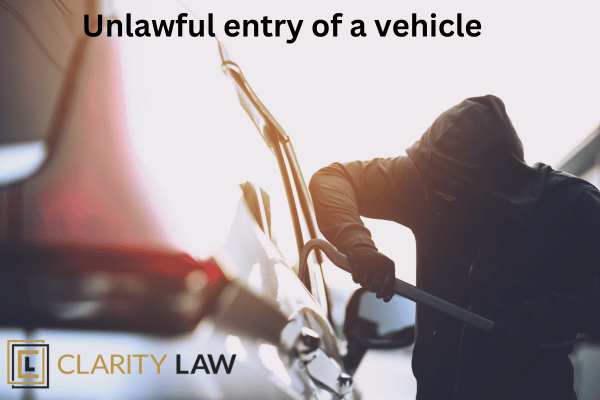
In Queensland there are a number of offences which exist under the umbrella of Burglary and like offences, of those a commonly charged offence is unlawful entry of a vehicle, for committing an indictable offence.
The Law
What does the law say the charge is?
(1) A person who unlawfully enters another person’s vehicle with intent to commit an indictable offence commits a crime.
(2) If—
(a) the offence is committed in the night; or
(b) the offender—
(i) uses or threatens to use actual violence; or
(ii) is or pretends to be armed with a dangerous or offensive weapon, instrument or noxious substance; or
(iii) is in company with 1 or more persons; or
(iv) damages, or threatens or attempts to damage, any property;
What do the police need to prove in order for this offence?
The police need to make out each of the following elements for an offence to have occurred:
A person,
-
Unlawfully enters;
-
Another person’s vehicle;
-
With the intent to commit an indictable offence.
This simply requires the police to prove that the defendant, has entered another person’s car without lawful reason, and that person had the intention to commit further offences.
There are, as shown above circumstances which increase the seriousness of the offending, these are called the circumstances of aggravation. The elements of these as above are straightforward, such as did they occur in the night, was the defendant armed or were they in a group.
Circumstances of aggravation expose a person to a greater maximum penalty than is available for the simpliciter offence.
What does this look like in practice?
James and a group of his friends are wandering around Chermside at 11pm at night. They come across an unlocked car and James’ decides to hotwire the car and go for a joy ride. James has entered the car, has his torso in the footwell and is attempting to start the car. A light inside the house comes on, James runs away into the night.
A CCTV camera has caught the event and James is identified and arrested. James has been charged with the offence for unlawfully entering the vehicle, with the intent to steal the car – being the indictable offence.
Defences
There are defences to the charge, including but not limited to:
- Genuine and honest mistake of fact;
- Lawful entry to the vehicle;
- Ownership of the vehicle;
- No intention of committing an indictable offence; or
- Duress
Penalty
The maximum penalty for this offence is up to 10 years imprisonment or if a circumstance of aggravation is present, up to 14 years.
The circumstances of aggravation are:
- uses or threatens to use actual violence; or
- is or pretends to be armed with a dangerous or offensive weapon, instrument or noxious substance; or
- is in company with 1 or more persons; or
- damages, or threatens or attempts to damage, any property;
The penalty range for the simpliciter offence is varied, ranging from a fine to a period of actual imprisonment. The court considers this to be a serious offence, and even more so where aggravating features are present.
Where will my matter be heard?
The matter will start in the magistrate’s court in the jurisdiction closest to where the offence occurred. The matter will stay in the magistrate’s court, unless violence was threatened or actually used, in which case the matter must be delt with on indictment in the district court.
Will I get a criminal conviction if I plead guilty to the charge?
The answer is possibly. It depends on a number of factors. Only an experienced criminal lawyer can give you advice on the best way to try and avoid a conviction being recorded if you plead guilty to this charge. Note however if imprisonment is part of the penalty then a conviction must be recorded.
Learn more about the difference between a conviction and non-conviction
The police want to talk to me about an offence!
Never ever give an interview to police without first getting legal advice. Even if you are innocent, even if you have a defence you could say the wrong thing and virtually guarantee you will be found guilty of the charge.
The police are not on your side, get immediate legal advice.
Learn more about your right to silence.
I’m not guilty of the offence.
Still don’t talk to the police. A lawyer would require the prosecutor to give them all their evidence and statements. This is known as the full brief of evidence. Once the brief was received then negotiations with the prosecutor to drop the charge can occur.
Learn more about what to do if accused of a crime you didn’t commit.
- I didn’t do it! What to do if Accused of a Crime you didn’t Commit
- Visit our main criminal law website
How do I get more information or engage you to act for me?
If you want to engage us or just need further free information or advice then you can either;
1. Use our contact form and we will contact you by email or phone at a time that suits you
2. Call us on 1300 952 255seven days a week, 7am to 7pm
3. Click hereto select a time for us to have a free 15 minute telephone conference with you
4. Email the firms founder on This email address is being protected from spambots. You need JavaScript enabled to view it.
5. Send us a message on Facebook Messenger
6. Click the help button at the bottom right and leave us a message
We are a no pressure law firm, we are happy to provide free initial information to assist you. If you want to engage us then great, we will give you a fixed price for our services so you will know with certainty what we will cost. All the money goes into a trust account monitored by the Queensland Law Society and cannot be taken out without your permission or until we are legally allowed to.






